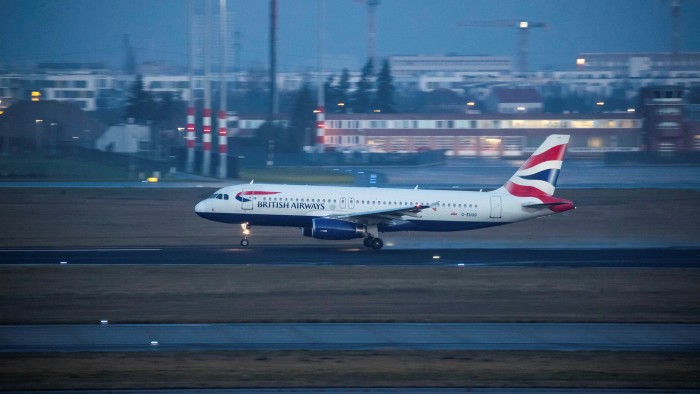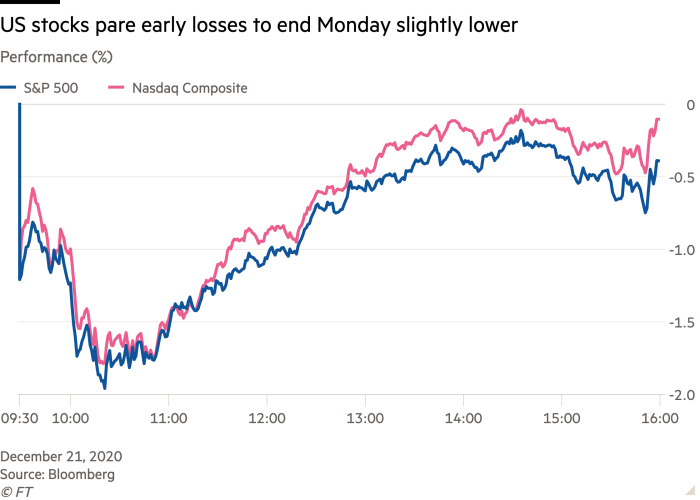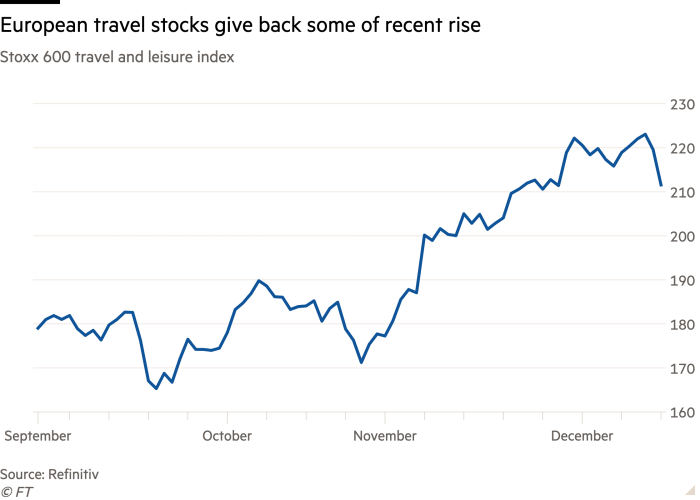Global stocks slip as new Covid strain unsettles investors

Simply sign up to the Coronavirus economic impact myFT Digest -- delivered directly to your inbox.
Global stock markets slipped and the price of oil declined after a new strain of coronavirus sweeping through parts of Britain sparked fears over further lockdowns and international travel restrictions.
The FTSE All World index fell 0.8 per cent on Monday, its worst day in three weeks. The drop was led by a sell-off in Europe, with the region-wide Stoxx 600 closing down 2.3 per cent and London’s FTSE 100 sinking 1.7 per cent.
The declines on Wall Street were moderate by comparison. The S&P 500 slipped 0.4 per cent, clawing back the majority of the losses that had taken it down as much as 2 per cent early in the trading day.
Roughly 80 per cent of the stocks within the US benchmark fell, with Tesla — which on Monday traded for the first time as part of the S&P 500 — leading the declines.
The tech-heavy Nasdaq Composite dropped 0.1 per cent. Measures of expected volatility on Wall Street also picked up, with the Cboe’s Vix index rising to 25.3.

On Saturday, Boris Johnson, UK prime minister, announced the tightest social restrictions since the March lockdown for more than 16m people in south-east England, including London. He also warned that a new mutation of Covid-19 was up to 70 per cent more transmissible.
The pound dropped 0.6 per cent to $1.345, as continental European governments banned travel from the UK. The restrictions come just as officials in Brussels and Westminster near the latest deadline in post-Brexit trade talks. Against the euro, the pound fell 0.1 per cent to €1.0996.
Brent crude settled 2.6 per cent lower at $50.91 a barrel. The international benchmark had traded as high as $52 this month for the first time since coronavirus swept into Europe in the spring, boosted by optimism about vaccines, but new lockdowns threaten oil demand.
“Investors fear the new strain is already in continental Europe and it is just a matter of time before we see fresh measures in Europe to contain it,” said Emiel van den Heiligenberg, head of asset allocation at Legal & General Investment Management. “We should assume it has spread to the US as well.”

Gregory Perdon, co-chief investment officer at private bank Arbuthnot Latham, added that market moves could be more pronounced on Monday than they normally would have been because of thin trading volumes in the run-up to Christmas.
“There’s always a sense of caution about trading around Christmas as there’s concern over whether markets can accommodate normal order flows,” he said. “And all of us are trying to wind down.”
The sell-off hit companies across sectors, with travel and hospitality groups particularly hard hit. British Airways and Iberia owner IAG fell 8 per cent, while Wynn Resorts and MGM Resorts declined more than 2 per cent.
The yield on the 10-year Treasury fell 0.01 percentage points to 0.93 per cent while the dollar rose marginally.
An agreement by US lawmakers on a near $900bn stimulus package to support small businesses and fund direct payments to American families suffering in the coronavirus pandemic failed to brighten market sentiment.
“The fresh virus concern overshadowed positive news that lawmakers in the US have finally reached a deal,” after months of wrangling, commented Mark Haefele, chief investment officer at UBS Global Wealth Management.
“The agreement on a $900bn Covid relief bill meets our base case expectation,” analysts at Morgan Stanley said. They added, however, that they were watching “legislative language” around the Federal Reserve’s emergency lending facilities as “a more considerable risk over the long term”.
Additional reporting by Philip Georgiadis
Comments